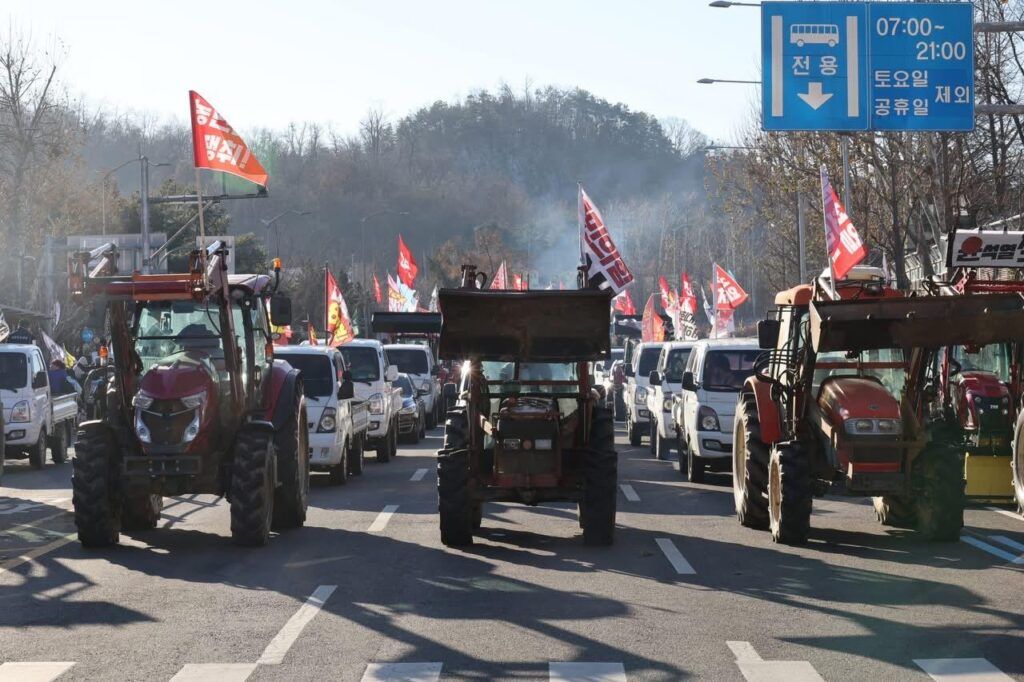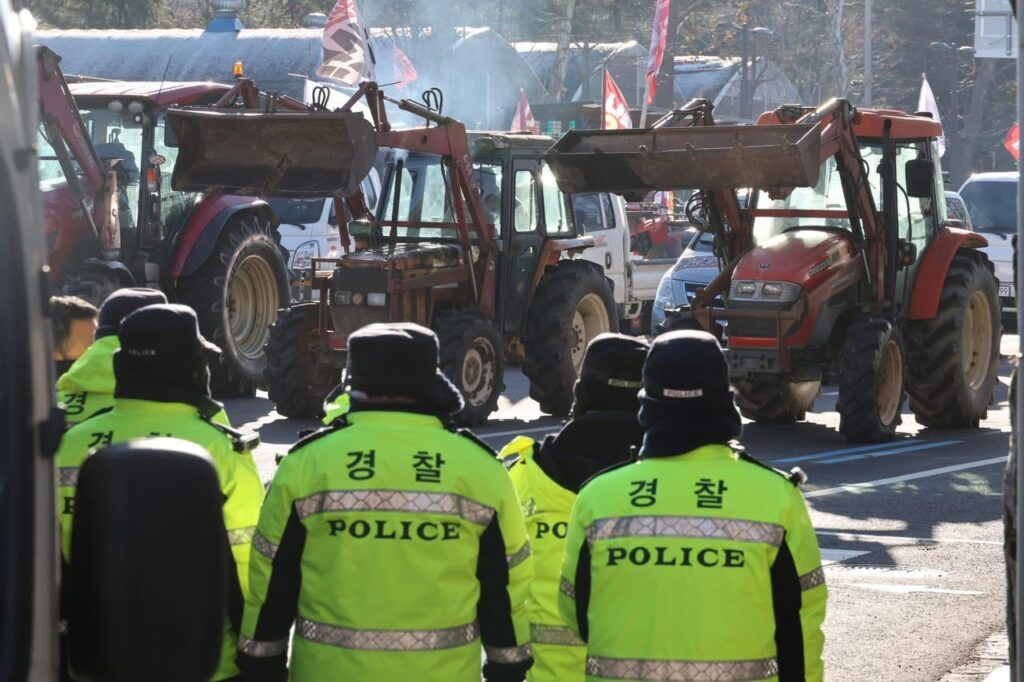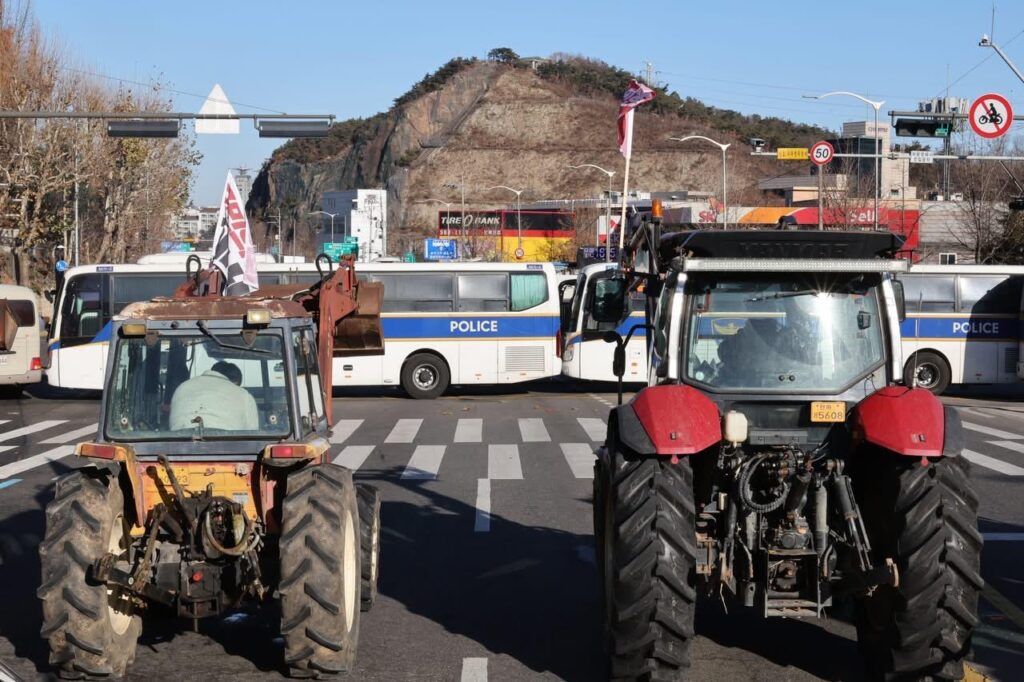South Korea: Peasant Unions and Urban Youth Unite to Overcome Police Barriers in ‘Victory at Namtaeryeong’
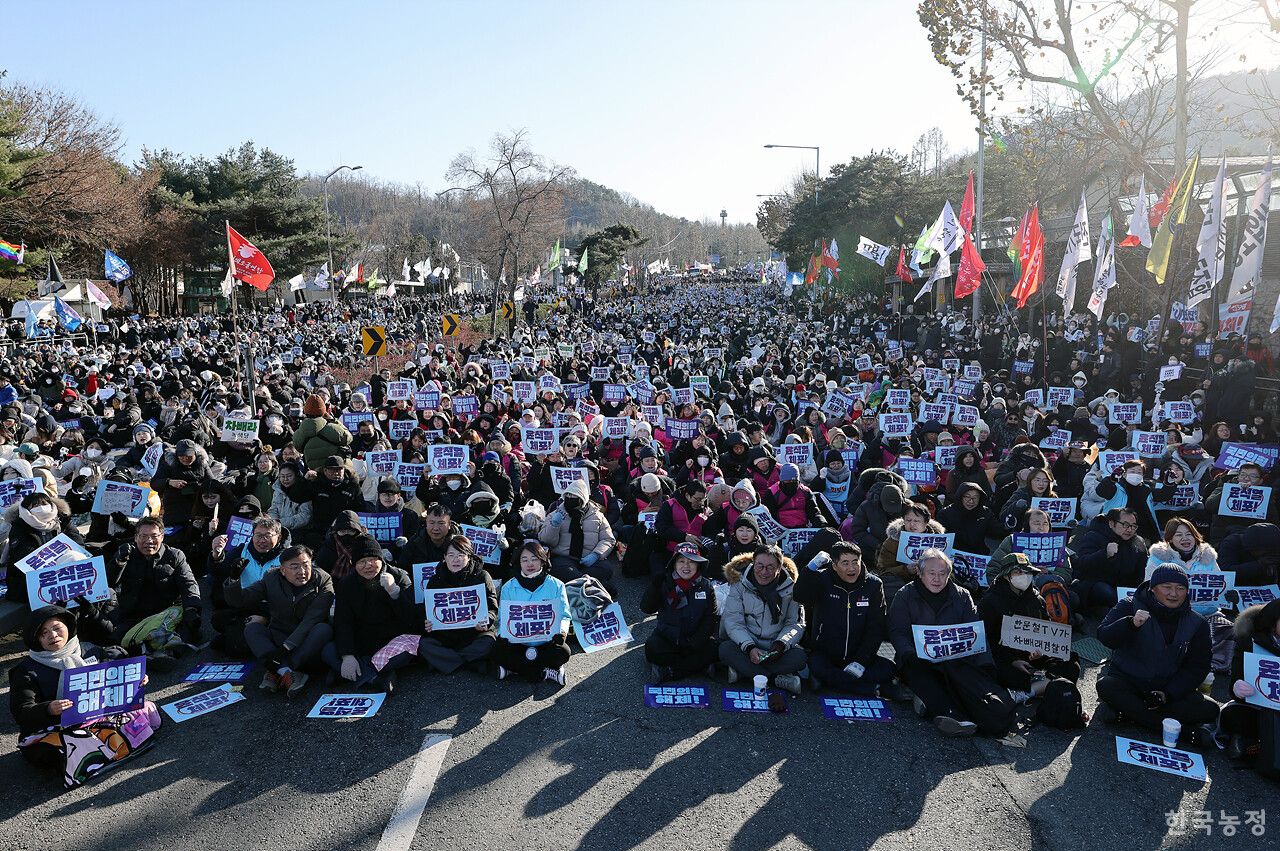
Over the past week, public calls for the arrest of impeached President Yoon Seok-yeol intensified as peasant organizations from across South Korea marched toward Seoul. Their demands included the abolition of open agricultural policies and urgent social reforms to support small-scale producers. However, on December 21st, police erected barricades to block the demonstrators, stationing vehicles to block the road leading to the president’s residence in Hannam-dong, Seoul.
In response, a powerful wave of solidarity emerged from citizens, particularly urban youth. Upon hearing that the Jeon Bong-jun Struggle Team’s tractor march had been blocked, many abandoned their daily routines and rushed to Namtaeryeong to join the farmers. The citizens’ support, especially from the youth, proved crucial in pushing the march forward. One farmer expressed his gratitude, saying, “Without the citizens standing with us, the police would have continued to advance.” Another added, “The presence of citizens, especially those who stayed overnight, gave us the strength to keep going.”
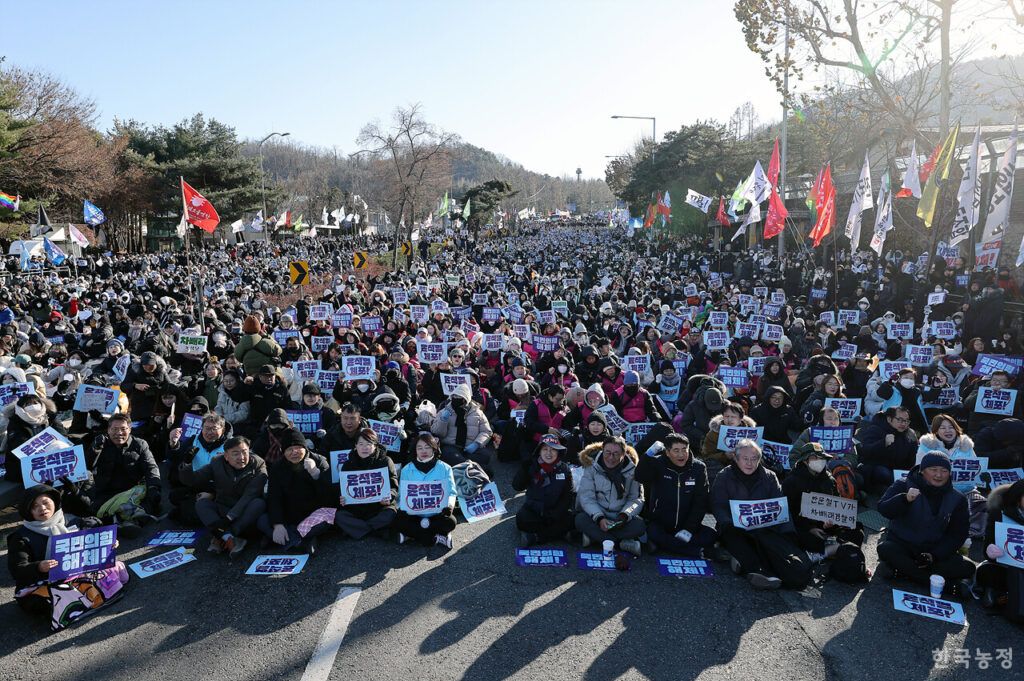
By December 22nd, after a two-day pause, the tractor march resumed, with farmers leading the way once again, cheered on by citizens who had come to their aid. This moment of unity marked a significant turning point in the ongoing struggle for social and agricultural reform.
The “Great Unity” of Gwangju in May 1980, and Namtaeryeong in December 2024
The scene at Namtaeryeong on the 21st and 22nd closely resembled the “Great Unity” of the Gwangju Uprising in May 1980. Citizens brought food, such as kimbap, bread, ramen, and coffee, as well as hot packs and blankets to help withstand the cold. They shared these supplies freely, encouraging one another. Those unable to come to Namtaeryeong sent donations to the Korean Peasants League (Jeonnong) and the Korean Peasant Women’s Association (Jeonyeong). Heated buses, chartered by fellow citizens to warm those enduring the cold at Namtaeryeong, also arrived. United across space and time, they overcame the cold and fear of the night together.
By noon on December 22nd, over 3,000 farmers and citizens (according to the organizers’ estimate) gathered at Namtaeryeong, chanting slogans like “Move the cars!”, “Arrest the traitor Yoon Seok-yeol!”, and “Drive Yoon Seok-yeol out and realize popular sovereignty!” Those on stage, waiting to speak, and even those singing, continued to shout, “Move the cars!” and “Get Yoon Seok-yeol out!”
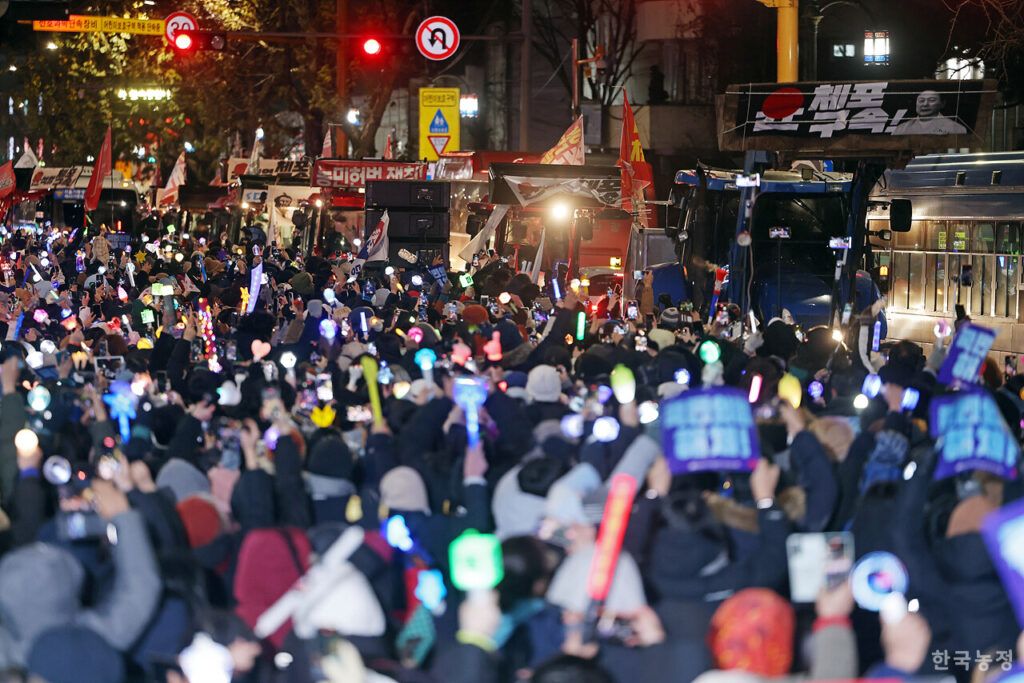
“Move the Cars!” Shouted by a Diverse ‘Us’
The rally was a diverse gathering, with speakers from all walks of life united by their commitment to breaking through police barricades and supporting the farmers’ struggle. Speakers, mostly women in their 20s and 30s, waited up to five hours to voice their support and demand justice. Many expressed deep gratitude to the farmers, with one speaker saying, “I feel ashamed for living without understanding the lives of farmers.”
Shin Woo-ri, daughter of the late Shin Yong-beom, former head of the Jincheon Farmers Association, paid tribute to her father’s legacy. “Dad, can you hear me? I think we can reach the world of farmer liberation you wanted,” she said, addressing the crowd. Her emotional plea for solidarity resonated deeply, with the crowd responding with a unified “Yes.”
Shin Woo-ri emphasized the rally’s unity, stating, “We are all different, but we came together in one mind to fight against police repression.”
The Joy of Changing the World Together
The atmosphere at the rally, which began at 2 PM, was electric, charged with determination and urgency. Both farmers and citizens passionately shared their personal stories, aspirations, and the barriers they faced. Speakers also rallied against discrimination and hate that divide communities, stressing that life is too short to endure a world that fosters such divisions.
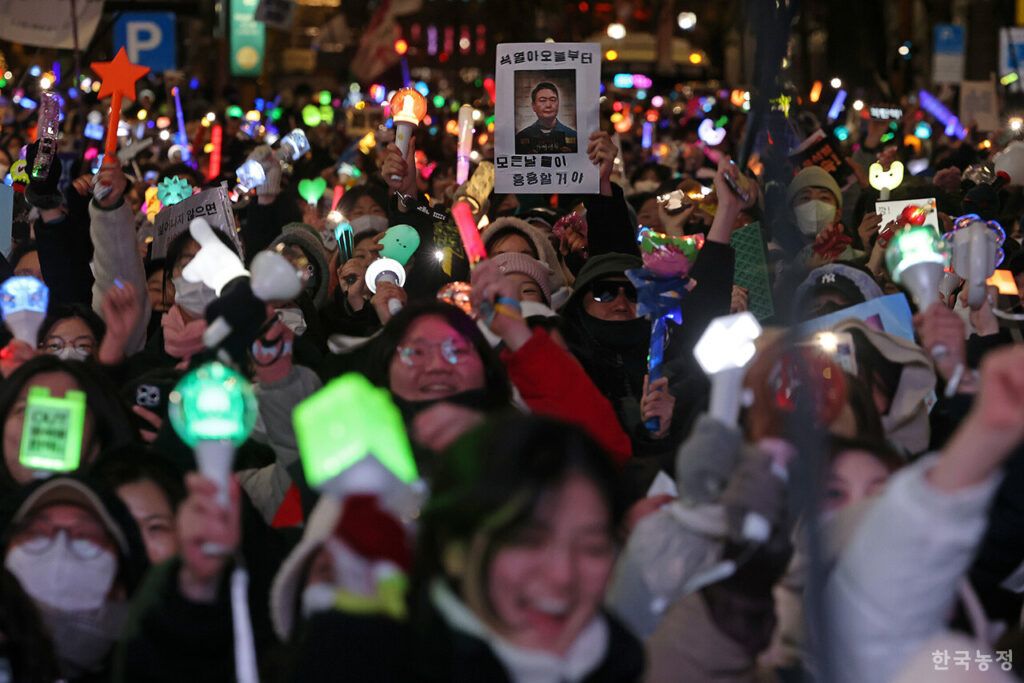
A young woman from Gwangju, who had lived away for ten years, expressed deep concern for the farmers of Honam, drawing a powerful comparison to the 1980 Gwangju Uprising. She called on the crowd to stand against the “Hate against Honam,” referencing the media’s vilification of the region in the wake of the tractor protests.
Farmers also shared their struggles, with Shin Ji-yeon, a female farmer from Buyeo in Chungcheongnam-do, highlighting the gender inequality that persists in rural areas. As an organic vegetable and rice grower, she urged the crowd to continue supporting the movement for a more just and equal society, stressing the need for greater recognition and support for women farmers.
The Victory March of Farmers and Citizens Breaking Through the Police Barricades
As the citizens’ rally at Namtaeryeong reached its peak, the crowd swelled to over 10,000 people. Near the rally’s conclusion, Hwon Oh, chairperson of the Korean Peasants League (Jeonnong), expressed his gratitude to the citizens who had stood with the farmers through the cold and fatigue. He then delivered the long-awaited news: the police had finally withdrawn the barricades, allowing the tractor procession to resume.
With the strength of their solidarity, farmers and citizens had won this crucial battle. The tractors roared to life once again, and the farmers began their march along the now-clear road. The crowd erupted in cheers and applause as the procession set off.
Over 10,000 citizens joined the farmers, chanting, “Arrest Yoon Seok-yeol!” as they filled the streets from Namtaeryeong to Sadang Station. As night fell, colorful cheering sticks lit up the scene, and the procession was met with excitement and support.
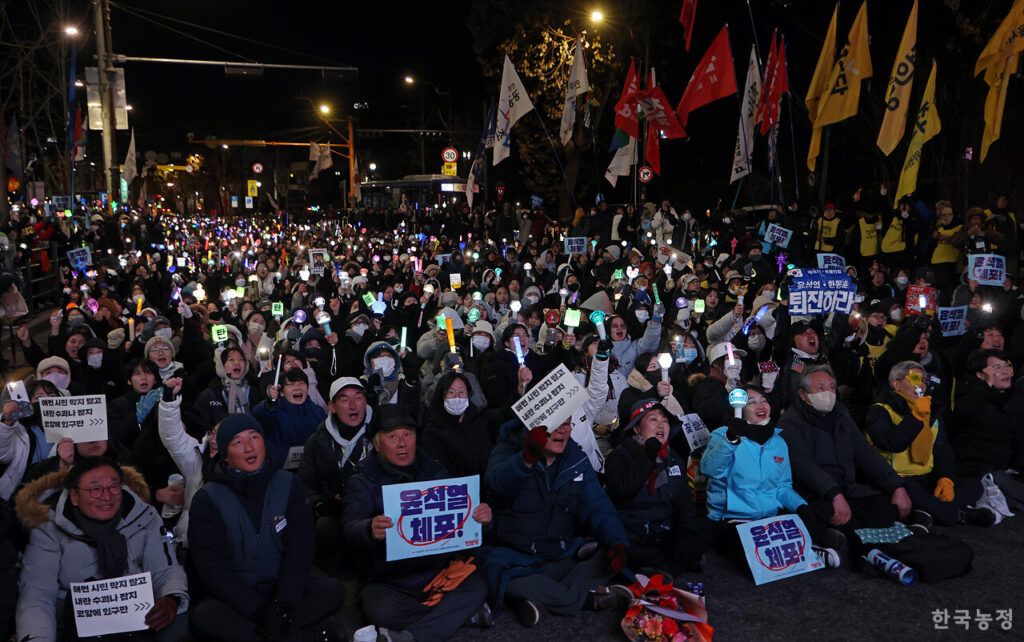
The march crossed the Dongjak Bridge and arrived at Han Gangjin Station, near the presidential residence in Yongsan. The rally culminated in front of Han Gangjin Station, where participants sang songs of triumph, celebrating their victory in breaking through the police barricades.
Chairperson Lee Chun-seon of the Korean Women Peasants’ Association closed with a powerful message: “Thanks to all of you, the Jeon Bong-jun Struggle Team’s tractors have made it here, near the president’s residence in Hanam-dong.” She vowed that the struggle would continue until their goals were fully achieved, drawing loud applause.
The article is based on a report by Kang Seon-il, a journalist for IKP News.

